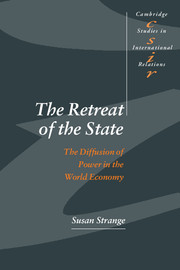Book contents
1 - The declining authority of states
from Part I - Theoretical foundations
Published online by Cambridge University Press: 07 October 2009
Summary
Today it seems that the heads of governments may be the last to recognise that they and their ministers have lost the authority over national societies and economies that they used to have. Their command over outcomes is not what it used to be. Politicians everywhere talk as though they have the answers to economic and social problems, as if they really are in charge of their country's destiny. People no longer believe them. Disillusion with national leaders brought down the leaders of the Soviet Union and the states of central Europe. But the disillusion is by no means confined to socialist systems. Popular contempt for ministers and for the head of state has grown in most of the capitalist countries – Italy, Britain, France and the United States are leading examples. Nor is the lack of confidence confined to those in office; opposition parties and their leaders are often no better thought of than those they wish to replace. In the last few years, the cartoonists and the tabloid press have been more bitter, less restrained critics of those in authority in government than at any other time this century. Although there are exceptions – mostly small countries – this seems to be a worldwide phenomenon of the closing years of the twentieth century, more evident in some places than others, but palpable enough to suggest that some common causes lie behind it.
- Type
- Chapter
- Information
- The Retreat of the StateThe Diffusion of Power in the World Economy, pp. 3 - 15Publisher: Cambridge University PressPrint publication year: 1996
- 3
- Cited by

